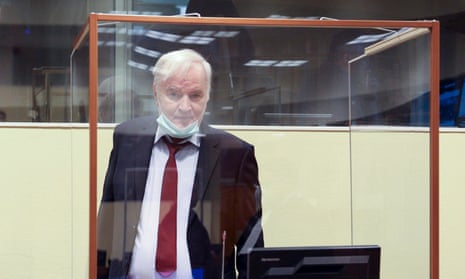The former Bosnian Serb commander Ratko Mladić, nicknamed the “butcher of Bosnia”, is facing a final day in court where he will hear judgment on his appeal against his conviction for genocide, war crimes and crimes against humanity.
Twenty-six years after the Srebrenica massacre, Mladić, 78, will appear at the United Nations-backed international criminal tribunal for the former Yugoslavia (ICTY) in The Hague on Tuesday for what is expected to be more than an hour of rulings.
Five judges will present their conclusions on 10 offences – involving extermination, forcible transfers, terror, hostage-taking and unlawful attacks on civilians – for which Mladić was given a life sentence in 2017.
The court will also rule on the request of the UN prosecutor Serge Brammertz for a further charge of genocide to be added to the list of convictions. It will be the court’s final judgment, without recourse to further appeal.
The mothers of some of the 8,000 men and boys killed in the worst act of bloodshed on European soil since the second world war are expected to gather outside the courtroom as the verdict arrives.
The outcome of the hearing remains uncertain, although Mladić is highly unlikely to walk free. That would require three of the judges to acquit him of all the charges.
The presiding judge in the case, Prisca Matimba Nyambe, from Zambia, gave a dissenting opinion in the 2012 conviction of Zdravko Tolimir, one of seven assistant commanders who reported directly to Mladić, arguing that the evidence against him was “circumstantial”.
She has also described Mladić’s conduct around Bosnian Muslims as being kind rather than threatening at the time when the “evacuation” of the civilian population was being planned.
“That some people felt intimidated by him at these meetings, to me, is not surprising given that Mladić was a well-known general with a commanding presence in a situation of great uncertainty,” she wrote.
This week Brammertz nevertheless said he was “cautiously optimistic” about the verdict, saying he “can’t imagine another outcome than confirmation”.
Iva Vukušić, a historian at Utrecht University and expert on war crime trials, said it would be important for the survivors for there to be a unanimous judgment.
She said: “This is really one of its most important trials, and it has been 25 years in the making. If they do convict but the presiding judge dissents really on the very substance of what happened then it’s less grave, he still goes to prison, but for a judgment it makes it weaker if the presiding judge says they fundamentally disagree. Then the nationalists have a field day saying: ‘Look they convicted him, but even the presiding judge didn’t believe it.’”
Mladić, who spent a decade on the run before his capture in 2011 in northern Serbia, was the chief of staff of Bosnian Serb forces from 1992 until 1996, during the civil war and ethnic cleansing that followed the breakup of the Yugoslav state.
Almost 600 people gave evidence for the prosecution and defence during the original four-year trial. Delivering the verdicts, the presiding judge, Alphons Orie, said the crimes ranked “among the most heinous known to humankind and include genocide and extermination”.
